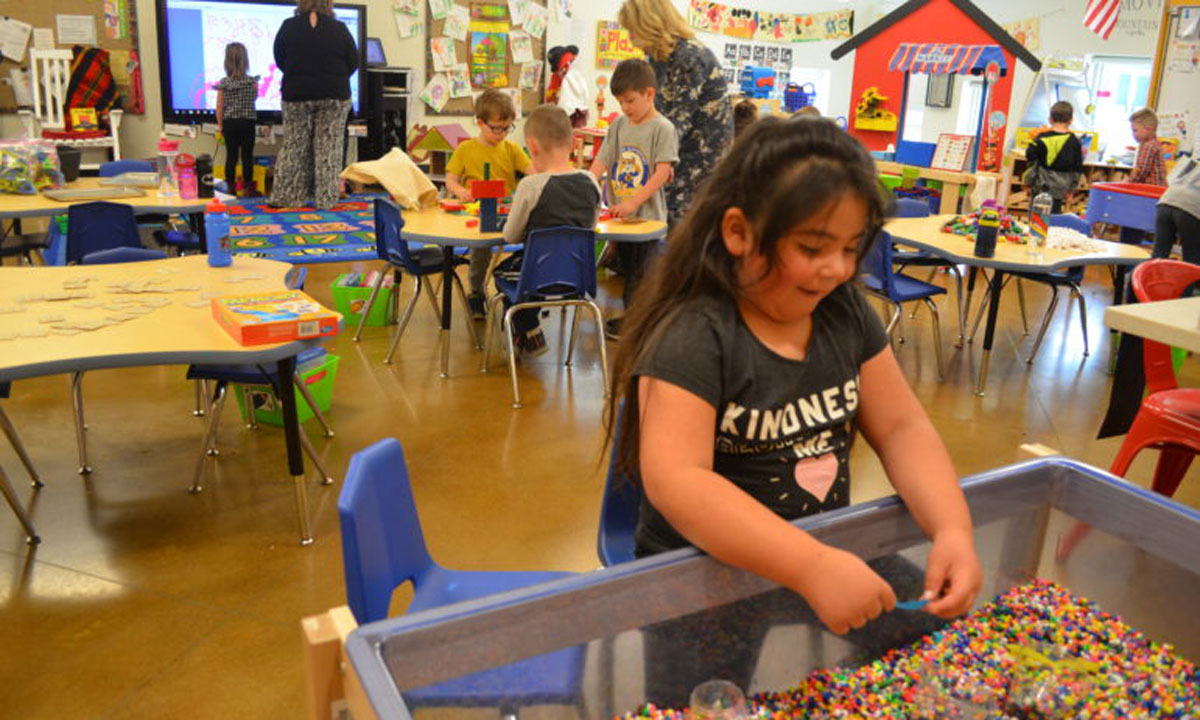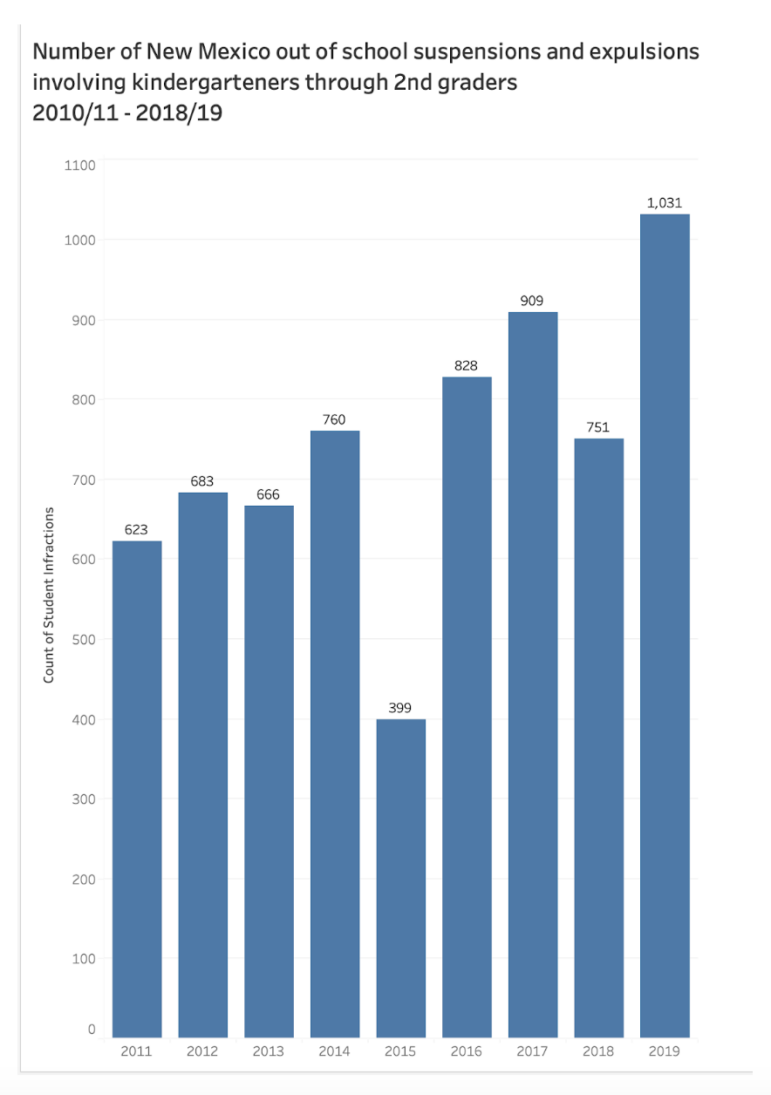NM Lawmaker Wants to Bar Most Early Childhood School Suspensions and Expulsions
The bill would also require detailed discipline data reporting that could help identify racial & other disparities in how these students are punished.

Get stories like this delivered straight to your inbox. Sign up for The 74 Newsletter
New Mexico lawmakers are debating a bill that would curtail expulsions and out-of-school suspensions for the state’s youngest students.
National studies show that children in child care and preschool programs are at least three times more likely than older children to be expelled. The bill would bar out-of-school suspensions for children younger than 8 years old, except in cases where the child threatened, attempted or caused bodily injury to another individual that was not in self-defense. And none of those suspensions would be allowed to exceed three days. It would bar expulsions except for instances where a child carried a deadly weapon to school. It would also require detailed discipline data reporting that could help identify racial and other disparities in how these students are punished.
“We’ll have data that can explain what’s happening, but also the impacts to the young child,” said the legislation’s sponsor, Sen. Harold Pope, D-Albuquerque, adding that Senate Bill 283 would help spot children who are “falling through the cracks or being harmed.”
The proposed law would apply to all public schools and licensed childcare facilities that receive funding from the state, although children whose parents pay the full cost of childcare would not be covered, according to an analysis by the Legislative Education Study Committee.
The legislation is supported by the state Public Education Department and Early Childhood Education and Care Department, as well as a dozen children’s advocacy organizations and the American Federation of Teachers. And the U.S. Departments of Health and Human Services and Education has issued a policy advisory urging states to “severely limit” expulsions and suspensions in early education settings. But the bill is facing pushback from New Mexico’s public school districts and some in the child care industry.
More than 900 children in kindergarten through second grade were suspended across New Mexico last school year, Early Childhood Education Cabinet Secretary Elizabeth Groginsky told the Senate Education Committee at a Feb. 13 hearing.
Federally funded Head Start programs, which enrolled almost 9,000 children last year, already prohibit suspensions and expulsions. But last school year, a little more than 32,000 children were enrolled in other pre-K programs or in childcare facilities funded by the state.
Data isn’t available for how many children enrolled in those childcare facilities have been suspended or expelled over the past decade. The proposed law would require that data be reported.
School districts are required to report discipline data for students in kindergarten through second grade. New Mexico In Depth obtained that data from the New Mexico Public Education Department (PED) for a story about school discipline published in December.
An analysis of that data showed that statewide, these children were suspended from school more than 7,400 times and expelled at least 17 times between the 2010-11 and 2020-21 school years. Of those suspensions, 5,481 involved violence, threats or weapons possession, but the data does not reveal how many of those incidents involved attempts to harm another student.

The number of out-of-school suspensions overall trended upward during those years.
More than a third of all K-2nd grade out-of-school suspensions and expulsions during 2010-11 to 2020-21 involved special education students, PED data showed. Eighty-seven percent involved boys.
Nationally, Native American, Hispanic, and African American preschoolers are more likely than white children to be kicked out of preschool, Groginsky said. Special education students are also more likely to be suspended, she noted.
“We see that it’s disproportionately boys, boys of color that are being suspended and expelled,” she said. “We see it in our own data. We see it in national data.”
Suspending young children from preschool or early grades leaves them more likely to drop out later in life, or to become incarcerated, Groginsky said.
The proposed law would require detailed reporting about how childcare and preschool facilities use in-school and out-of-school suspension to discipline children. Licensed preschool and childcare facilities receiving state funds would have to report details about the grade, race, ethnicity, English learner status and disabilities of students, children’s total numbers of in-school and out-of-school suspensions, and the misbehavior leading to suspension. They would also be required to report the total number of days a child was excluded from class, and if the child was sent to an “alternative education setting” such as a detention room during in- or out-of-school suspensions.
“There’s an opportunity here for us to truly understand what’s happening in our early childhood classrooms all the way through early elementary, and to use that data to drive better decision making, better supports, and help for our classroom educators,” Groginsky said.
Detailed early childhood suspension data would also help the state with outreach to train teachers and administrators about implicit (unconscious) teacher and administrator bias, Groginsky said.
“We need to prioritize for all of our early elementary educators research-based, trauma-informed professional development,” Groginsky told New Mexico In Depth. It is “essential” that young children learn how to solve problems and resolve conflict, and that means training early-childhood educators how to help children develop those skills, she added.
The legislation specifies no penalties for facilities that fail to comply, and the bill would not impose any significant costs on state government other than the cost of receiving discipline reports. But critics said the bill could prove costly for preschools and childcare facilities to implement, and could open up childcare centers to lawsuits if they are unable to remove children from classrooms for longer periods of time.
The New Mexico School Superintendents Association and New Mexico School Boards Association asked that lawmakers exclude kindergarten through second grade from the bill, leaving only preschools, but a motion failed in the Senate Education Committee that would have amended the bill to do so.
Sen. Bill Soules, a Democrat from Las Cruces and himself an educator, voiced concern about the state’s “incredible shortage” of behavioral health providers – experts who would be needed to help preschool facilities address problematic behavior and avoid out-of-school suspensions. But Groginsky said her department stands ready to provide clinical experts to help preschool facilities, and to coach teachers and administrators.
“They would be contractors,” Groginsky said. “We have 15 right now going through using our federal relief money, going through a certification program. So our goal is to have 15 full-time … infant and early childhood Mental Health consultants. And our goal is to grow that to about 60 over the next three to five years.”
The bill now awaits its second hearing, by the Senate Judiciary Committee, with just a little more than three weeks left in the legislative session.
his article was originally published by New Mexico In Depth.
Get stories like these delivered straight to your inbox. Sign up for The 74 Newsletter

;)